The document outlines the legislative department of the Philippines, detailing the structure and powers of Congress, which consists of the Senate and the House of Representatives. It specifies eligibility criteria, election procedures, terms of office, and powers related to law-making, budgeting, and wartime actions, as well as the processes for appointing officials and conducting inquiries. The document also includes provisions governing legislative sessions, member privileges, and the handling of bills and appropriations.
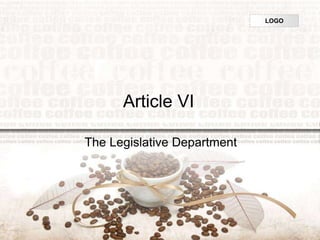
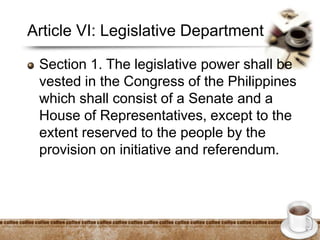
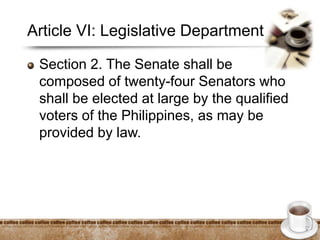
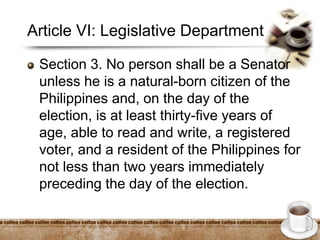
![Article VI: Legislative Department
Section 4. The term of office of the
Senators shall be six years and shall
commence, unless otherwise provided by
law, at noon on the thirtieth day of June
next following their election. No Senator
shall serve for more than two consecutive
terms. [cont]](https://image.slidesharecdn.com/articlevi-170118015543/85/Article-VI-Legislative-Department-5-320.jpg)
![Article VI: Legislative Department
Section 4. [cont] Voluntary renunciation
of the office for any length of time shall
not be considered as an interruption in
the continuity of his service for the full
term of which he was elected.](https://image.slidesharecdn.com/articlevi-170118015543/85/Article-VI-Legislative-Department-6-320.jpg)
![Article VI: Legislative Department
Section 5. (1) The House of
Representatives shall be composed of
not more than two hundred and fifty
members, unless otherwise fixed by law,
who shall be elected from legislative
districts apportioned among the
provinces, cities, and the Metropolitan
Manila area in accordance with the
number of their respective inhabitants,
[cont]](https://image.slidesharecdn.com/articlevi-170118015543/85/Article-VI-Legislative-Department-7-320.jpg)
![Article VI: Legislative Department
Section 5. (1) [cont] and on the basis of a
uniform and progressive ratio, and those
who, as provided by law, shall be elected
through a party-list system of registered
national, regional, and sectoral parties or
organizations.](https://image.slidesharecdn.com/articlevi-170118015543/85/Article-VI-Legislative-Department-8-320.jpg)
![Article VI: Legislative Department
Section 5. (2) The party-list
representatives shall constitute twenty
per centum of the total number of
representatives including those under the
party list. For three consecutive terms
after the ratification of this Constitution,
one-half of the seats allocated to party-
list representatives shall be filled, as
provided by law, [cont]](https://image.slidesharecdn.com/articlevi-170118015543/85/Article-VI-Legislative-Department-9-320.jpg)
![Article VI: Legislative Department
Section 5. (2) [cont] by selection or
election from the labor, peasant, urban
poor, indigenous cultural communities,
women, youth, and such other sectors as
may be provided by law, except the
religious sector.](https://image.slidesharecdn.com/articlevi-170118015543/85/Article-VI-Legislative-Department-10-320.jpg)
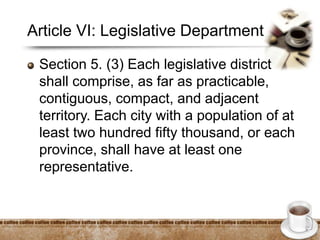
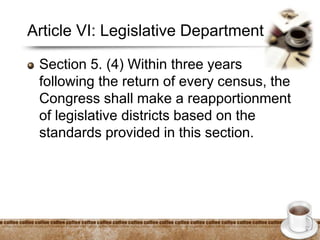
![Article VI: Legislative Department
Section 6. No person shall be a Member
of the House of Representatives unless
he is a natural-born citizen of the
Philippines and, on the day of the
election, is at least twenty-five years of
age, able to read and write, and, [cont]](https://image.slidesharecdn.com/articlevi-170118015543/85/Article-VI-Legislative-Department-13-320.jpg)
![Article VI: Legislative Department
Section 6. [cont] except the party-list
representatives, a registered voter in the
district in which he shall be elected, and
a resident thereof for a period of not less
than one year immediately preceding the
day of the election.](https://image.slidesharecdn.com/articlevi-170118015543/85/Article-VI-Legislative-Department-14-320.jpg)
![Article VI: Legislative Department
Section 7. The Members of the House of
Representatives shall be elected for a
term of three years which shall begin,
unless otherwise provided by law, at
noon on the thirtieth day of June next
following their election. No Member of
the House of Representatives shall serve
for more than three consecutive terms.
[cont]](https://image.slidesharecdn.com/articlevi-170118015543/85/Article-VI-Legislative-Department-15-320.jpg)
![Article VI: Legislative Department
Section 7.[cont] Voluntary renunciation of
the office for any length of time shall not
be considered as an interruption in the
continuity of his service for the full term
for which he was elected.](https://image.slidesharecdn.com/articlevi-170118015543/85/Article-VI-Legislative-Department-16-320.jpg)
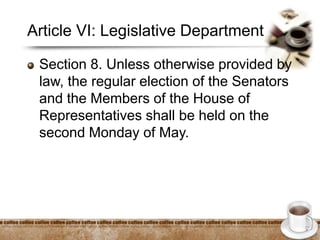
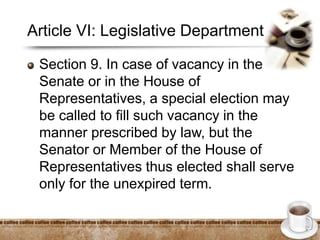
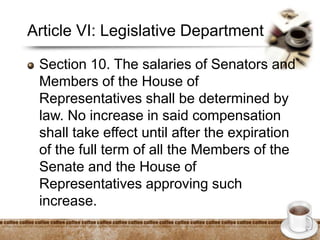
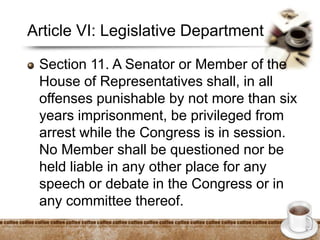
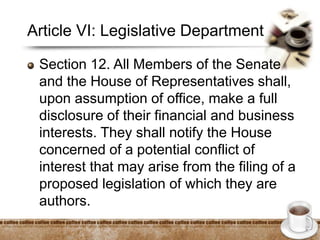
![Article VI: Legislative Department
Section 13. No Senator or Member of the
House of Representatives may hold any
other office or employment in the
Government, or any subdivision, agency,
or instrumentality thereof, including
government-owned or controlled
corporations or their subsidiaries, during
his term without forfeiting his seat. [cont]](https://image.slidesharecdn.com/articlevi-170118015543/85/Article-VI-Legislative-Department-22-320.jpg)
![Article VI: Legislative Department
Section 13. [cont] Neither shall he be
appointed to any office which may have
been created or the emoluments thereof
increased during the term for which he
was elected.](https://image.slidesharecdn.com/articlevi-170118015543/85/Article-VI-Legislative-Department-23-320.jpg)
![Article VI: Legislative Department
Section 14. No Senator or Member of the
House of Representatives may
personally appear as counsel before any
court of justice or before the Electoral
Tribunals, or quasi-judicial and other
administrative bodies. [cont]](https://image.slidesharecdn.com/articlevi-170118015543/85/Article-VI-Legislative-Department-24-320.jpg)
![Article VI: Legislative Department
Section 14. [cont] Neither shall he,
directly or indirectly, be interested
financially in any contract with, or in any
franchise or special privilege granted by
the Government, or any subdivision,
agency, or instrumentality thereof,
including any government-owned or
controlled corporation, or its subsidiary,
during his term of office. [cont]](https://image.slidesharecdn.com/articlevi-170118015543/85/Article-VI-Legislative-Department-25-320.jpg)
![Article VI: Legislative Department
Section 14. [cont] He shall not intervene
in any matter before any office of the
Government for his pecuniary benefit or
where he may be called upon to act on
account of his office.](https://image.slidesharecdn.com/articlevi-170118015543/85/Article-VI-Legislative-Department-26-320.jpg)
![Article VI: Legislative Department
Section 15. The Congress shall convene
once every year on the fourth Monday of
July for its regular session, unless a
different date is fixed by law, and shall
continue to be in session for such
number of days as it may determine until
thirty days before the opening of its next
regular session, exclusive of Saturdays,
Sundays, and legal holidays. [cont]](https://image.slidesharecdn.com/articlevi-170118015543/85/Article-VI-Legislative-Department-27-320.jpg)
![Article VI: Legislative Department
Section 15. [cont] The President may call
a special session at any time.](https://image.slidesharecdn.com/articlevi-170118015543/85/Article-VI-Legislative-Department-28-320.jpg)
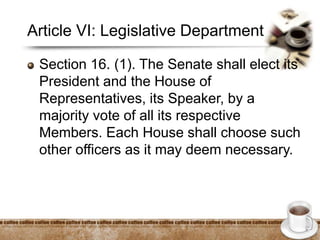
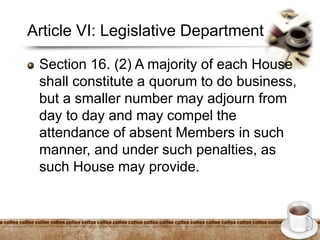
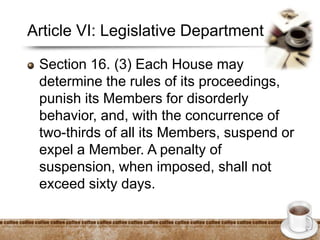
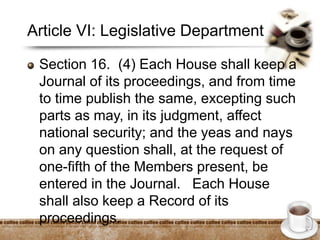
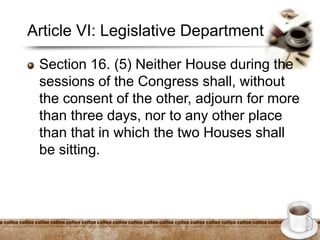
![Article VI: Legislative Department
Section 17. The Senate and the House of
Representatives shall each have an
Electoral Tribunal which shall be the sole
judge of all contests relating to the
election, returns, and qualifications of
their respective Members. [cont]](https://image.slidesharecdn.com/articlevi-170118015543/85/Article-VI-Legislative-Department-34-320.jpg)
![Article VI: Legislative Department
Section 17. [cont] Each Electoral Tribunal
shall be composed of nine Members,
three of whom shall be Justices of the
Supreme Court to be designated by the
Chief Justice, and the remaining six shall
be Members of the Senate or the House
of Representatives, as the case may be,
who shall be chosen [cont]](https://image.slidesharecdn.com/articlevi-170118015543/85/Article-VI-Legislative-Department-35-320.jpg)
![Article VI: Legislative Department
Section 17. [cont] on the basis of
proportional representation from the
political parties and the parties or
organizations registered under the party-
list system represented therein. The
senior Justice in the Electoral Tribunal
shall be its Chairman.](https://image.slidesharecdn.com/articlevi-170118015543/85/Article-VI-Legislative-Department-36-320.jpg)
![Article VI: Legislative Department
Section 18. There shall be a Commission
on Appointments consisting of the
President of the Senate, as ex officio
Chairman, twelve Senators, and twelve
Members of the House of
Representatives, [cont]](https://image.slidesharecdn.com/articlevi-170118015543/85/Article-VI-Legislative-Department-37-320.jpg)
![Article VI: Legislative Department
Section 18. [cont] elected by each House
on the basis of proportional
representation from the political parties
and parties or organizations registered
under the party-list system represented
therein. The chairman of the Commission
shall not vote, except in case of a tie.
[cont]](https://image.slidesharecdn.com/articlevi-170118015543/85/Article-VI-Legislative-Department-38-320.jpg)
![Article VI: Legislative Department
Section 18. [cont] The Commission shall
act on all appointments submitted to it
within thirty session days of the Congress
from their submission. The Commission
shall rule by a majority vote of all the
Members.](https://image.slidesharecdn.com/articlevi-170118015543/85/Article-VI-Legislative-Department-39-320.jpg)
![Article VI: Legislative Department
Section 19. The Electoral Tribunals and
the Commission on Appointments shall
be constituted within thirty days after the
Senate and the House of
Representatives shall have been
organized with the election of the
President and the Speaker. [cont]](https://image.slidesharecdn.com/articlevi-170118015543/85/Article-VI-Legislative-Department-40-320.jpg)
![Article VI: Legislative Department
Section 19. [cont] The Commission on
Appointments shall meet only while the
Congress is in session, at the call of its
Chairman or a majority of all its
Members, to discharge such powers and
functions as are herein conferred upon it.](https://image.slidesharecdn.com/articlevi-170118015543/85/Article-VI-Legislative-Department-41-320.jpg)
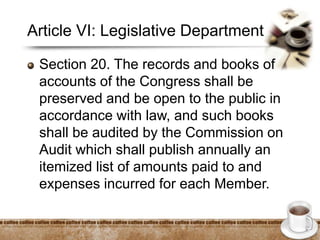
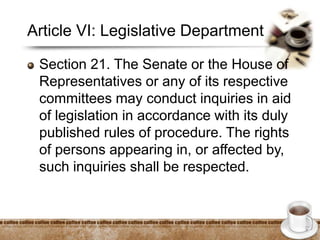
![Article VI: Legislative Department
Section 22. The heads of departments
may, upon their own initiative, with the
consent of the President, or upon the
request of either House, as the rules of
each House shall provide, appear before
and be heard by such House on any
matter pertaining to their departments.
[cont]](https://image.slidesharecdn.com/articlevi-170118015543/85/Article-VI-Legislative-Department-44-320.jpg)
![Article VI: Legislative Department
Section 22. [cont] Written questions shall
be submitted to the President of the
Senate or the Speaker of the House of
Representatives at least three days
before their scheduled appearance.
Interpellations shall not be limited to
written questions, but may cover matters
related thereto. [cont]](https://image.slidesharecdn.com/articlevi-170118015543/85/Article-VI-Legislative-Department-45-320.jpg)
![Article VI: Legislative Department
Section 22. [cont] Written questions shall
be submitted to the President of the
Senate or the Speaker of the House of
Representatives at least three days
before their scheduled appearance.
Interpellations shall not be limited to
written questions, but may cover matters
related thereto. [cont]](https://image.slidesharecdn.com/articlevi-170118015543/85/Article-VI-Legislative-Department-46-320.jpg)
![Article VI: Legislative Department
Section 22. [cont] When the security of
the State or the public interest so
requires and the President so states in
writing, the appearance shall be
conducted in executive session.](https://image.slidesharecdn.com/articlevi-170118015543/85/Article-VI-Legislative-Department-47-320.jpg)
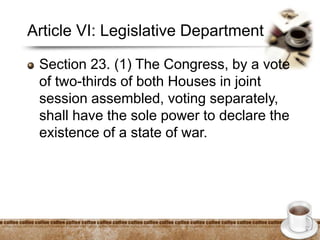
![Article VI: Legislative Department
Section 23. (2) In times of war or other
national emergency, the Congress may,
by law, authorize the President, for a
limited period and subject to such
restrictions as it may prescribe, to
exercise powers necessary and proper to
carry out a declared national policy. [cont]](https://image.slidesharecdn.com/articlevi-170118015543/85/Article-VI-Legislative-Department-49-320.jpg)
![Article VI: Legislative Department
Section 23. (2) [cont] Unless sooner
withdrawn by resolution of the Congress,
such powers shall cease upon the next
adjournment thereof.](https://image.slidesharecdn.com/articlevi-170118015543/85/Article-VI-Legislative-Department-50-320.jpg)
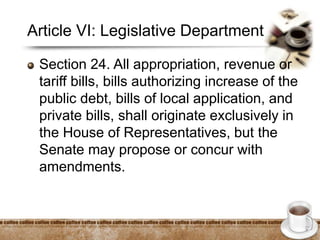
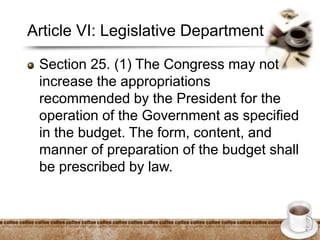
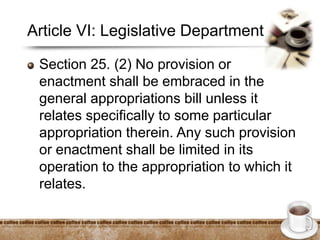
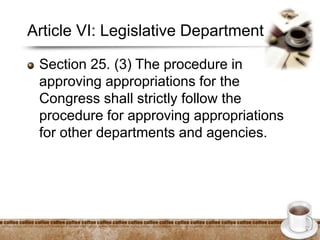
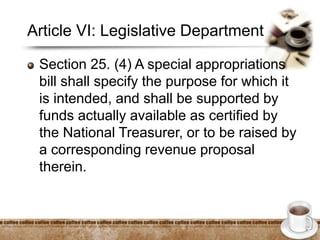
![Article VI: Legislative Department
Section 25. (5) No law shall be passed
authorizing any transfer of
appropriations; [cont]](https://image.slidesharecdn.com/articlevi-170118015543/85/Article-VI-Legislative-Department-56-320.jpg)
![Article VI: Legislative Department
Section 25. (5) [cont] however, the
President, the President of the Senate,
the Speaker of the House of
Representatives, the Chief Justice of the
Supreme Court, and the heads of
Constitutional Commissions may, by law,
be authorized to augment any item in the
general appropriations law for their
respective offices from savings in other
items of their respective appropriations.](https://image.slidesharecdn.com/articlevi-170118015543/85/Article-VI-Legislative-Department-57-320.jpg)
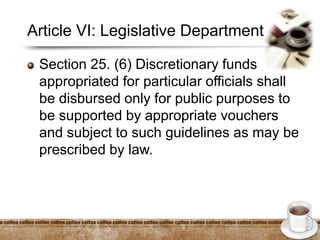
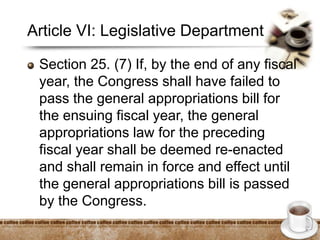
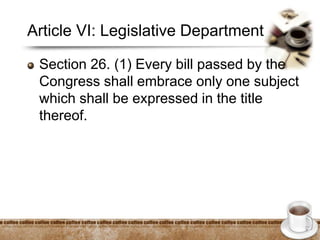
![Article VI: Legislative Department
Section 26. (2) No bill passed by either
House shall become a law unless it has
passed three readings on separate days,
and printed copies thereof in its final form
have been distributed to its Members
three days before its passage, except
when the President certifies to the
necessity of its immediate enactment to
meet a public calamity or emergency.
[cont]](https://image.slidesharecdn.com/articlevi-170118015543/85/Article-VI-Legislative-Department-61-320.jpg)
![Article VI: Legislative Department
Section 26. (2) [cont] Upon the last
reading of a bill, no amendment thereto
shall be allowed, and the vote thereon
shall be taken immediately thereafter,
and the yeas and nays entered in the
Journal.](https://image.slidesharecdn.com/articlevi-170118015543/85/Article-VI-Legislative-Department-62-320.jpg)
![Article VI: Legislative Department
Section 27. (1) Every bill passed by the
Congress shall, before it becomes a law,
be presented to the President. If he
approves the same he shall sign it;
otherwise, he shall veto it and return the
same with his objections to the House
where it originated, which shall enter the
objections at large in its Journal and
proceed to reconsider it. [cont]](https://image.slidesharecdn.com/articlevi-170118015543/85/Article-VI-Legislative-Department-63-320.jpg)
![Article VI: Legislative Department
Section 27. (1) [cont] If, after such
reconsideration, two-thirds of all the
Members of such House shall agree to
pass the bill, it shall be sent, together
with the objections, to the other House by
which it shall likewise be reconsidered,
and if approved by two-thirds of all the
Members of that House, it shall become
a law. [cont]](https://image.slidesharecdn.com/articlevi-170118015543/85/Article-VI-Legislative-Department-64-320.jpg)
![Article VI: Legislative Department
Section 27. (1) [cont] In all such cases,
the votes of each House shall be
determined by yeas or nays, and the
names of the Members voting for or
against shall be entered in its Journal.
The President shall communicate his
veto of any bill to the House where it
originated within thirty days after the date
of receipt thereof, otherwise, it shall
become a law as if he had signed it.](https://image.slidesharecdn.com/articlevi-170118015543/85/Article-VI-Legislative-Department-65-320.jpg)
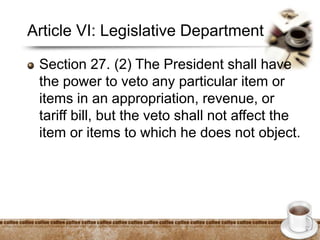
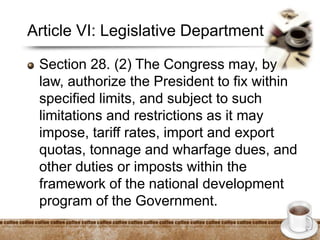
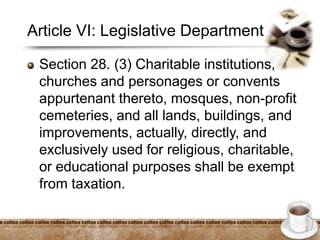
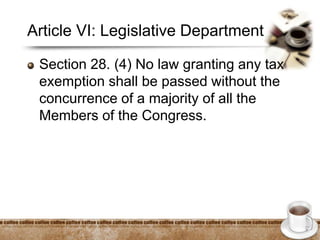
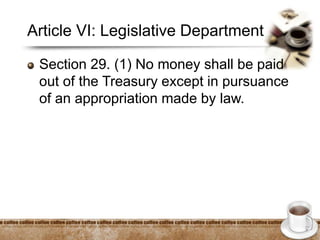
![Article VI: Legislative Department
Section 29. (2) No public money or
property shall be appropriated, applied,
paid, or employed, directly or indirectly,
for the use, benefit, or support of any
sect, church, denomination, sectarian
institution, or system of religion, or of any
priest, preacher, minister, other religious
teacher, [cont]](https://image.slidesharecdn.com/articlevi-170118015543/85/Article-VI-Legislative-Department-71-320.jpg)
![Article VI: Legislative Department
Section 29. (2) [cont] or dignitary as
such, except when such priest, preacher,
minister, or dignitary is assigned to the
armed forces, or to any penal institution,
or government orphanage or
leprosarium.](https://image.slidesharecdn.com/articlevi-170118015543/85/Article-VI-Legislative-Department-72-320.jpg)
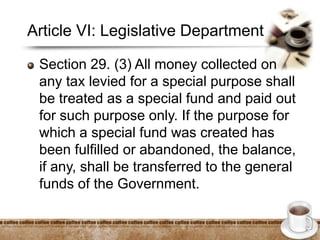
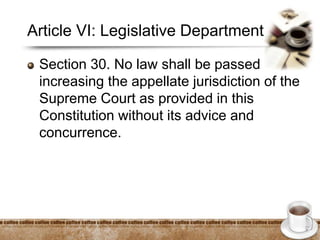
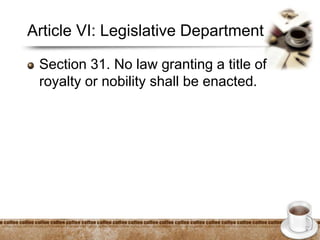
![Article VI: Legislative Department
Section 32. The Congress shall, as early
as possible, provide for a system of
initiative and referendum, and the
exceptions therefrom, whereby the
people can directly propose and enact
laws or approve or reject any act or law
or part thereof passed by the Congress
or local legislative body [cont]](https://image.slidesharecdn.com/articlevi-170118015543/85/Article-VI-Legislative-Department-76-320.jpg)
![Article VI: Legislative Department
Section 32. [cont] after the registration of
a petition therefor signed by at least ten
per centum of the total number of
registered voters, of which every
legislative district must be represented by
at least three per centum of the
registered voters thereof.](https://image.slidesharecdn.com/articlevi-170118015543/85/Article-VI-Legislative-Department-77-320.jpg)

